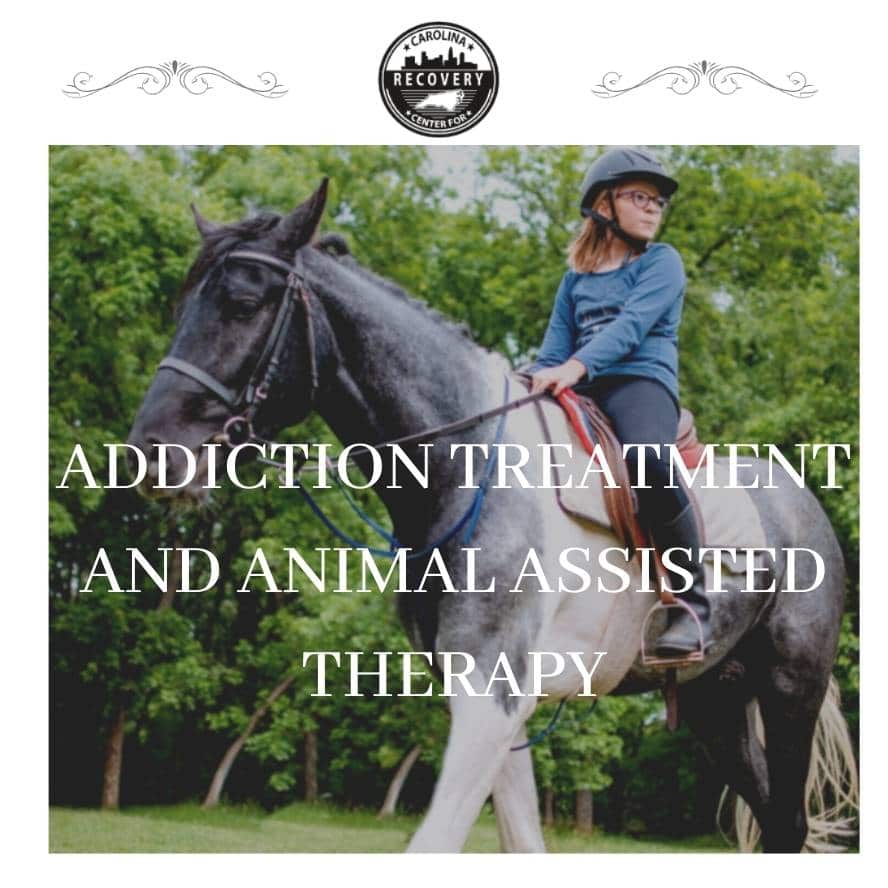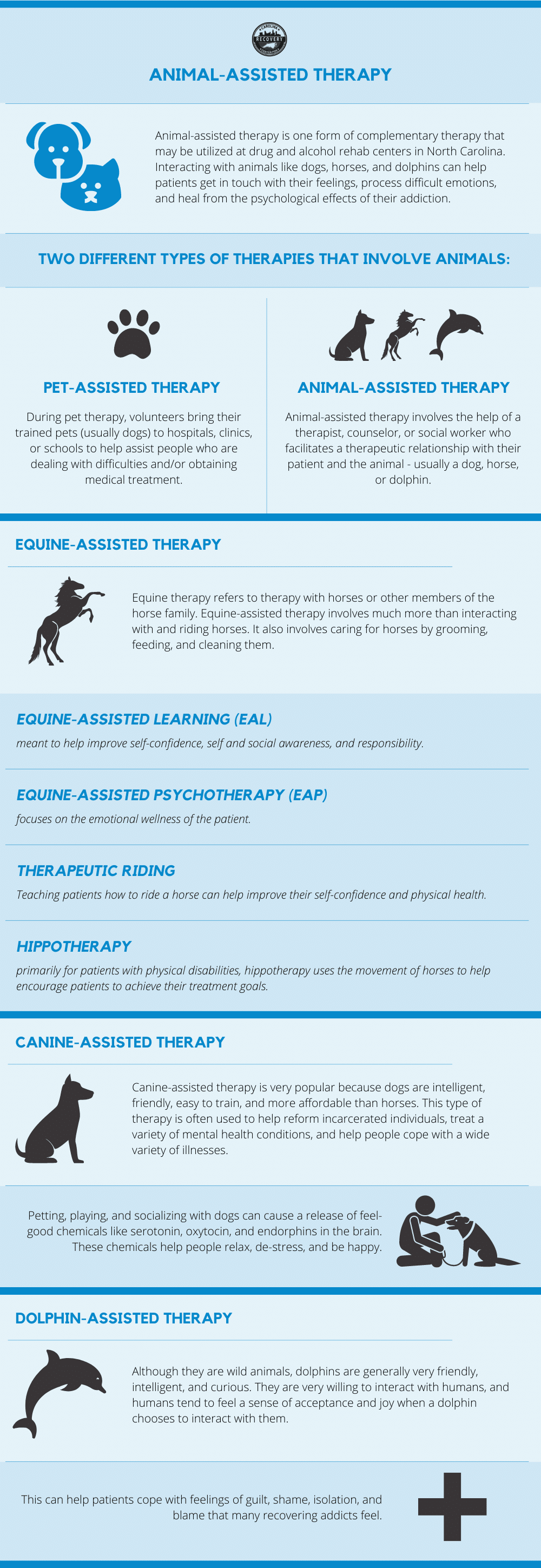Addiction Treatment and Animal-Assisted Therapy

Medically Verified: 2/1/24
Medical Reviewer
Chief Editor

All of the information on this page has been reviewed and verified by a certified addiction professional.
Animal-assisted therapy is one form of complementary therapy that may be utilized at drug and alcohol rehab centers in North Carolina. Interacting with animals like dogs, horses, and dolphins can help patients get in touch with their feelings, process difficult emotions, and heal from the psychological effects of their addiction.
This type of therapy is not intended to be a standalone treatment for addiction, rather a supplemental therapy that accompanies a comprehensive treatment program. In addition, animal therapy can be used to treat so much more than just addiction, including mental health conditions, behavioral disorders, and more.
What is Animal-Assisted Therapy?

The therapeutic relationship between animals and humans was first acknowledged by Florence Nightingale in the mid-1800s. She found that pets were able to reduce anxiety in psychiatric patients – both in adults and children.[1]
While the role of animals in therapy slowly progressed over time, it began to take off in the mid-1900s when psychotherapists began exploring how relationships with animals could benefit humans in therapy. Then, in the late ‘80s, the first formal programs for using animals in therapy were developed.
Today, animals are used in therapy sessions to help treat a variety of mental and behavioral health conditions. In general, there are two different types of therapies that involve animals:
- Pet-assisted therapy – During pet therapy, volunteers bring their trained pets (usually dogs) to hospitals, clinics, or schools to help assist people who are dealing with difficulties and/or obtaining medical treatment. This type of therapy does not require a therapist or social worker. Instead, participants are simply allowed to enjoy being around and petting a gentle and loving animal.
- Animal-assisted therapy – Animal-assisted therapy involves the help of a therapist, counselor, or social worker who facilitates a therapeutic relationship with their patient and the animal – usually a dog, horse, or dolphin.
Equine-Assisted Therapy
Equine therapy refers to therapy with horses or other members of the horse family. There are several different subsets of equine therapy, including:[2]
- Equine-assisted learning (EAL) – this practice focuses on teaching patients how to cope with their emotions and manage their responses through means of understanding their horse’s responses. EAL is meant to help improve self-confidence, self and social awareness, and responsibility.
- Equine-assisted psychotherapy (EAP) – This technique incorporates horses and traditional psychotherapy. EAP focuses on the emotional wellness of the patient.
- Therapeutic riding – Teaching patients how to ride a horse can help improve their self-confidence and physical health.
- Hippotherapy – primarily for patients with physical disabilities, hippotherapy uses the movement of horses to help encourage patients to achieve their treatment goals.
Equine-assisted therapy involves much more than interacting with and riding horses. It also involves caring for horses by grooming, feeding, and cleaning them. This helps give recovering addicts a sense of responsibility and purpose because they must care for another living creature – particularly one that is larger and more powerful than them.
Horses can easily pick up on people’s emotions, so if the patient is angry or anxious, the horse may not respond positively. The patient may recognize this and begin to better regulate and cope with their emotions. In the process of developing a relationship with a horse, patients are able to work on their communication skills, impulse control, emotional management, and much more.
Canine-Assisted Therapy
Dogs make for great therapy animals for the same reasons they make great pets: they are loving, fun, and gentle. Canine-assisted therapy is very popular because dogs are intelligent, friendly, easy to train, and more affordable than horses. This type of therapy is often used to help reform incarcerated individuals, treat a variety of mental health conditions, and help people cope with a wide variety of illnesses.
Petting, playing, and socializing with dogs can cause a release of feel-good chemicals like serotonin, oxytocin, and endorphins in the brain.[3] These chemicals help people relax, de-stress, and be happy.
In the process of building a relationship with a dog, patients are able to relax and be more willing to open up to their therapist about things they are struggling with. If the patient struggles to express him or herself to the therapist, he or she may talk to the dog, instead. This helps foster trusting and healthy communication between patients and their counselors
Dogs may be brought in from a shelter, by staff members, or by the patients themselves. Canine-assisted therapy can help people in recovery heal from trauma, develop compassion, and cope with loneliness, depression, and anxiety.
Dolphin-Assisted Therapy
Rehab facilities that are near the coastline may offer some form of dolphin-assisted therapy. This may involve swimming with dolphins or interacting with them in a tank.
Although they are wild animals, dolphins are generally very friendly, intelligent, and curious. They are very willing to interact with humans, and humans tend to feel a sense of acceptance and joy when a dolphin chooses to interact with them. This can help patients cope with feelings of guilt, shame, isolation, and blame that many recovering addicts feel.
Finding Addiction Treatment With Animal-Assisted Therapy
If you or someone you know is seeking treatment for addiction and/or mental health, it may be beneficial for you to consider treatment programs where animal-assisted therapy is offered. No matter your treatment needs, our experts at Carolina Center for Recovery are here to help connect you with the right program for you. Call today to get started on your recovery journey.
References:

